Leymah Gbowee
Speed read
Leymah Gbowee was awarded the Nobel Peace Prize, jointly with Ellen Johnson Sirleaf and Tawakkol Karman, for her non-violent struggle for the safety of women and for women’s rights to full participation in peace-building work.

Full name: Leymah Gbowee
Born: 1 February 1972, Monrovia, Liberia
Date awarded: 7 October 2011
Unified Christians and Muslims against the dictator
Leymah Gbowee got the Nobel Peace Prize because she mobilised and organised women of all ethnic and religious backgrounds, in order to end the prolonged war in Liberia and to secure women’s participation in its elections. In 2002, Gbowee organised the peace movement “Women of Liberia Mass Action for Peace” which included both Muslim and Christian women. Through non-violent protests with prayers for peace the organisation became a key factor in the downfall of dictator Charles Taylor and the ending of the civil war. Gbowee has since helped strengthen women’s influence in Liberia and other parts of West Africa, and today heads the ”Women’s Peace and Security Network Africa (WIPSEN)”. Leymah Gbowee was born in Liberia in 1972, has six children and lives in Accra, Ghana.
"We cannot achieve democracy and lasting peace in the world unless women obtain the same opportunities as men to influence the development of society at all levels of society."
- The Norwegian Nobel Committee, Oslo, 7 October, 2011.
Educated peace activist
In addition to having a Masters degree in Conflict Transformation from the USA, Gbowee is also a trauma therapist. In a number of positions, Gbowee has shown a true ability to focus people on common goals. In particular, this concerns her efforts to end to the bloody civil war. After the civil war Gbowee’s efforts have included the rehabilitation of Charles Taylor’s child soldiers, and she was also commissioner for Liberia’s Truth and Reconciliation Commission. Gbowee plays a central role in the award-winning documentary “Pray the Devil Back to Hell” which shows the struggle for democracy in Liberia.
| Democracy Greek for government by the people. A form of government in which all adult citizens participate in the governing of the state and everyone is equal under the law. Most democracies are representative governments. Individuals are elected to assemblies that take decisions on behalf of all citizens. |
From 12 to 15 peace prize women
The peace prize to Ellen Johnson Sirleaf, Leymah Gbowee and Tawakkol Karman resulted in a significant increase in the number of female peace prize laureates. Until 2011, only 12 of 97 individual peace prize laureates were women. The first was Bertha von Suttner in 1905 and the last Wangari Maathai in 2004. The Norwegian Nobel Committee hopes that the prize to Sirleaf, Gbowee and Karman can help to end the oppression of women which is common in many countries, and to unleash women’s enormous potential for democracy and peace.

Major rebuilding required
Liberia is still struggling with the material and social fallout from 14 years of brutal civil war that began with the revolt and assassination of President Samuel Doe in 1989. Doe had himself seized power a decade earlier in a military coup, subsequently executing the former president, most of his cabinet and other government officials. By 2003, 270,000 people had been killed, 1/3 of the population had fled their homes, and the country’s economy and infrastructure had largely ceased to function. In other words, the country had to be rebuilt almost from scratch.
Three share the peace prize
The Nobel Peace Prize 2011 was awarded equally to Ellen Johnson Sirleaf, Leymah Gbowee and Tawakkol Karman. They got the prize for their non-violent struggle for women’s security and the right to full participation in peace-building activities. This is the second time in the Nobel Peace Prize’s history that it is awarded to three individuals. The first time was in 1994, when the prize went to Yasser Arafat, Shimon Peres and Yitzhak Rabin for their efforts to bring peace in the Middle East.

"If any changes were to be made in society it had to be by the mothers."
- Leymah Gbowee, Gruber Foundation, Women’s Rights Prize, 2009.

Learn more
2011 Nobel Peace Laureate Leymah Gbowee is a Liberian peace activist, social worker and women’s rights advocate. She is Founder and President of the Gbowee Peace Foundation Africa, based in Monrovia ...
Disclaimer: Every effort has been made by the publisher to credit organisations and individuals with regard to the supply of photographs. Please notify the publishers regarding corrections.
Nobel Prizes and laureates
Six prizes were awarded for achievements that have conferred the greatest benefit to humankind. The 14 laureates' work and discoveries range from quantum tunnelling to promoting democratic rights.
See them all presented here.
